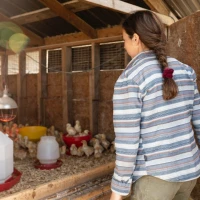Celery is a common vegetable found in many households, celebrated for its crunchy texture and dietary benefits. However, when it comes to feeding our feathery friends in the backyard, questions often arise about the safety and nutritional impact of human foods on chickens. In this comprehensive exploration, we’ll dive into the depths of whether chickens can have celery and the surprising truths that come to light.
Engaging in the world of backyard poultry care entails a continuous learning curve. From understanding their unique dietary needs to guaranteeing their safety and health, each decision we make for our chickens can have significant implications. As we discuss the place of celery in a chicken’s diet, we will unravel all facets, from the nutritional profile to the best practices for feeding this crunchy vegetable to your flock.
Is Celery Safe for Chickens?
When contemplating what snacks to offer your chickens, it’s paramount to establish one rule of thumb: not all human food is safe for birds. With the rising trend of organic and natural feeding, numerous poultry owners are pondering: can chickens have celery as part of their varied diet?
Nutritional Content of Celery
Celery is low in calories but rich in essential nutrients. Here’s a look at what it offers:
- Vitamins: A good source of vitamins A, K, and C.
- Minerals: Offers minerals such as potassium and folate.
- Fiber: High in dietary fiber, which is beneficial for digestive health.
Potential Hazards of Feeding Celery to Chickens
Despite its nutritional profile, celery comes with a few cautionary notes:
- Stringy Texture: Celery contains tough, fibrous strings that can pose a choking hazard or impact a chicken’s digestive system.
- Low-Calorie Content: While low calories are generally positive, chickens require energy-dense foods to maintain their activity levels.
How to Safely Introduce Celery Into a Chicken’s Diet
If you decide to feed celery to your chickens, there are safe ways to introduce this crunchy vegetable into their diet.
Preparing Celery for Chickens
- Chop in Small Pieces: To prevent choking, chop celery into small, easily digestible pieces.
- Remove Strings: It’s best to remove fibrous strings to avoid digestive issues.
Moderation Is Key
- Frequency: Celery should only be a treat, not a staple in their diet.
- Quantity: Ensure celery makes up a minor part of the overall diet – think of it as a supplement to their regular feed.
The Benefits of Celery for Chickens
While it’s important to remain cautious, there are clear benefits when chickens have celery in moderation.
Vitamins and Hydration
Celery’s high water content can help keep chickens hydrated, especially during warmer months. Additionally, the vitamins in celery support overall health and well-being.
Nutritional Supplement
As a supplement, celery can provide an extra nutritional boost alongside a balanced diet.
What Other Vegetables Can Chickens Eat?
Chickens can have celery, but it’s not their only option. To ensure a diversified diet, here’s a list of other chicken-safe vegetables:
- Lettuce and Leafy Greens
- Cooked Pumpkin and Squash
- Cucumbers
- Carrots (grated or cooked)
Best Practices for Feeding Chickens Vegetables
To optimize the nutritional benefits while mitigating risks, follow these best practices:
- Variety: Offer a wide range of vegetables.
- Preparation: Cut or cook vegetables to aid in digestion.
The Chicken’s Natural Diet and How Celery Fits In
Chickens are omnivores by nature. Understanding their natural diet is crucial to determining how celery fits into their daily consumption.
The Foraging Nature of Chickens
Chickens naturally forage for grains, seeds, insects, and small amounts of green vegetation. This instinctual behavior informs us about the limitations and opportunities for feeding them vegetables like celery.
Incorporating Vegetables Into a Natural Diet
To mimic a natural diet:
- Introduce celery as part of a mix of forage items.
- Ensure access to a balanced poultry feed to cover their nutritional essentials.
Understanding the Digestive System of Chickens
To appreciate the dietary needs of chickens, we need to delve into their digestive systems.
How Chickens Digest Food
Chickens have a unique digestive tract, including a gizzard that grinds food. This system can handle a variety of food types but still requires care when introducing new items such as celery.
The Role of Treats like Celery
Treats should complement the main diet and not interfere with the critical balance of nutrients that regular poultry feed provides. Celery can play a part as a treat, enhancing variety without causing harm.
Potential Downsides of Feeding Chickens Too Much Celery
Highlights of the potential issues with feeding large amounts of celery include:
Nutritional Imbalance
- Overconsumption can lead to a lack of essential nutrients.
- Celery’s high water content may dilute the nutritional density.
Digestive Problems
- Too much celery might lead to digestive discomfort.
- The fibrous nature of celery could potentially cause impaction.
How to Monitor Your Chickens’ Health After Introducing New Foods
After bringing new elements like celery into your chickens’ diet, it’s important to watch for signs of indigestion or distress, such as:
- Changes in droppings
- Lack of appetite
- Lethargy or unusual behavior
Conclusion: Smart, Safe Snacking for Your Feathered Friends
In conclusion, chickens can have celery, but it’s vital to exercise caution. This crunchy vegetable can be a healthy and enjoyable treat for chickens when incorporated correctly. Remember, the key is moderation and careful preparation to ensure your chickens continue to thrive on a balanced, nutritious diet.
By following the guidance and insights provided, you can make informed decisions about including celery in your chickens’ diet without compromising their health or well-being. Happy and healthy snacking awaits your backyard flock, revealing the surprising truths behind the question: Can chickens eat celery?










